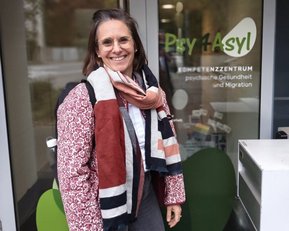
Teaching German to school children, running a hostel, picnics on the beach and horseback riding by the sea - business psychology student Gabriella Guida is having an exciting time in Crotone, Calabria, Italy.
Teaching German to school children, running a hostel, picnics on the beach and horseback riding by the sea - business psychology student Gabriella Guida is having an exciting time in Crotone, Calabria, Italy.
In this blog, we tell the story of her placement abroad and discover why she wholeheartedly recommends the Erasmus+ programme.
Gabriella Guida from Munich is a committed and determined young woman. With Erasmus+, she embarked on an adventure that has changed her life and career prospects. Born and raised in Germany with Italian roots, she discovered her passion for education and intercultural exchange through her Erasmus+ placement in Crotone, in the deep south of Italy.
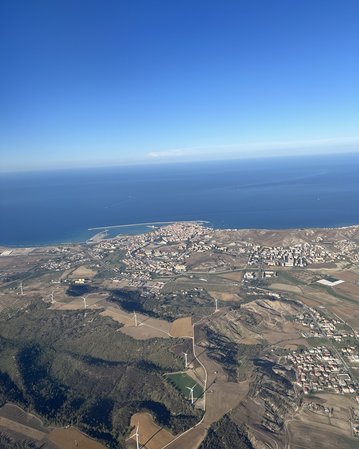
Gabriella has always loved working with children. She considered studying to become a teacher early on, but her path took a different direction. After graduating from high school, she decided to train as a nurse. "I wanted to learn from the ground up, because I believe that if you want to manage something, you have to understand the practical side first". This training gave her not only practical knowledge, but also valuable insights into the healthcare system. But she wanted more. Gabriella opted for a dual degree in business administration with a focus on public management with the city of Munich. After graduating, she knew she wanted to move further into the field of HRD. She started a Masters in Business Psychology & Leadership at the SRH Fernhochschule while continuing to work for the city.
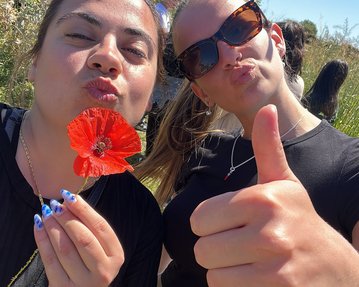
As part of her Master's programme, Gabriella decided to do an Erasmus+ internship in Calabria. "The internship was important for me because I wanted to compare southern Germany with southern Italy." She works with the organisation "Amici del Tedesco" (Friends of the German Language) and supports the teaching of German in a local "Media", a kind of secondary school. "We go to the school and teach the students German. Gabriella also organises many extra-curricular activities for the students, who are aged between 10 and 14. They cook German dishes or bake typical German cakes, such as carrot cake.
"We also accompany the classes on excursions where we involve the children in outdoor activities," says the Masters student. Of course, the aim is always to incorporate as much German learning as possible into these activities. Gabriella herself has learnt a few things along the way: She has fond memories of a visit to a botanical garden. There, the children were taught how such projects often develop on land formerly controlled by the mafia, and the importance of education in combating the mafia. "The children were very interested in how education can help fight the mafia. It was incredibly motivating to see this curiosity and to help them explore new horizons. Calabria, on the southern tip of Italy, is commonly known as "mafia country".
In a YouTube video from the organisation, Gabriella and another intern give an insight into their work.
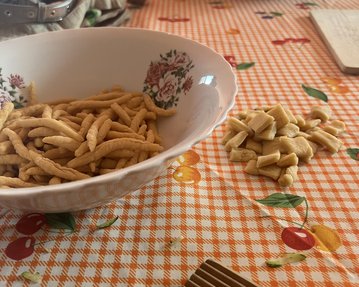
In addition to her internship, Gabriella took on various daily tasks. The director of the organisation for which she teaches German also owns two hostels, one of which is in the old town of Crotone. At Casa di Chiara she took on other organisational tasks. "We prepared breakfast for the guests, greeted them and gave them their rooms". Gabriella found the cultural differences in terms of organisation particularly striking: "In Germany, if I say, 'Let's meet at 2 o'clock to go to the beach,' then that's what happens. Here we don't get to the beach before 4 p.m. You always have to add an extra hour or two," she says with a smile.
Studying business psychology has helped Gabriella to be more effective in her job. "I can apply a lot of what I've learnt, especially in the areas of people development and intercultural management. She has learnt the importance of being flexible and adapting to different working cultures.
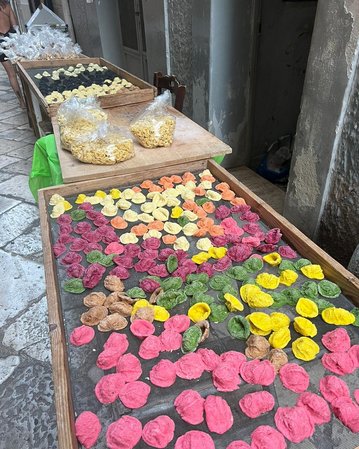
Despite working 30 hours a week, Gabriella has time to enjoy the beauty of Calabria.
"I'm only a 10-minute walk from the sea as we live right in the city centre." She embraces Italian culture and takes the opportunity to improve her language skills. Her experiences have been varied and exciting: from sunset picnics on the beach in Crotone with fellow interns, to cocktail workshops, horseback riding by the sea, day trips and weekend stays in Tropea, Matera, Bari, Alberobello, Bologna, Naples and a boat trip to Capri. Gabriella also has fond memories of wine tasting in Cirò and making pasta together.
Gabriella also recounts some unique experiences in Calabria. One of the group's favourite restaurants was Gambero Rosso, run by a Canadian woman and her Greek husband. "They often prepared something special for us that wasn't on the menu." On one occasion, the group was asked if they wanted to see the tuna they had just eaten. "We weren't prepared for how big a tuna can be! And apparently it was still a teenager," the student recalls with a laugh.
Another memorable experience was an evening in an Irish pub, where the group was surprised by the large portions. "The prices were so low that we thought the portions must be small. We were completely wrong!"
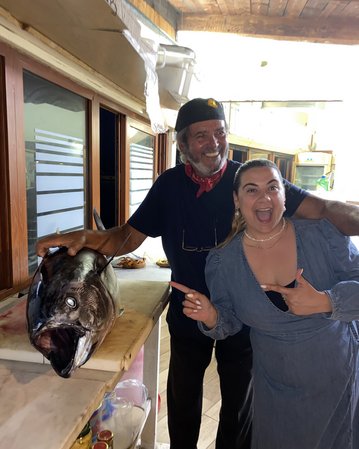
Gabriella's verdict on her Erasmus+ adventure is clear: "I can only recommend it." She emphasises the importance of being open to new experiences and embracing cultural differences. For students at SRH Fernhochschule, she sees the Erasmus+ programme as a valuable addition: "It offers the opportunity to apply theoretical knowledge in practice and to experience a new culture at the same time. "Finally, Gabriella encourages her fellow students to have similar experiences: "Be brave and take the opportunities that are offered to you. It's worth it!"

Marketing & Sales / Press & Media Relations